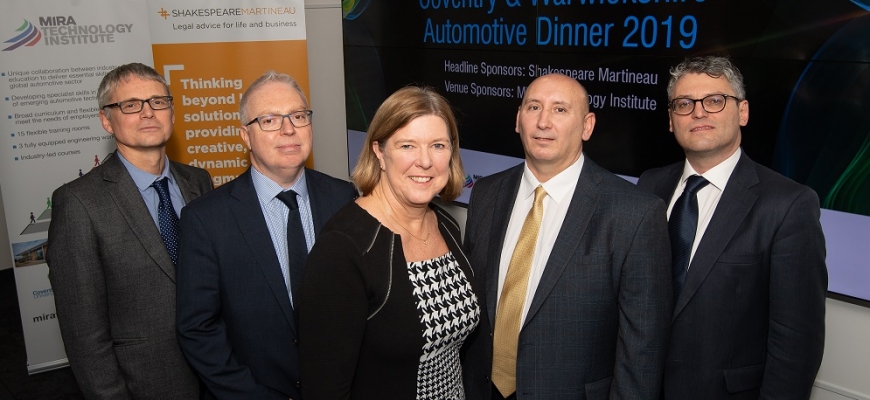
The UK’s ambitions for supporting a strong and sustainable battery industry will be achieved when the UK Battery Industrialisation Centre (UKBIC) opens near Coventry next year.
The £129 million development will see the creation of a new 20,000 sqm facility to develop the latest battery technology and will provide a boost to the UK’s ambition to lead the world in the development of zero emission vehicles as part of the Government’s Industrial Strategy and the Faraday Battery Challenge.
A study recently published by the Faraday Institution has shown that UK and European demand for UK-produced batteries could reach between 60 and 200 GWh per year by 2040. This would result in the equivalent need for between four–13 ‘gigafactories’ (large, high volume battery manufacturing plants).
Jeff Pratt, the managing director of UKBIC, was the keynote speaker at the Coventry & Warwickshire Automotive Dinner which was organised by Coventry City Council, Warwickshire County Council and the Coventry and Warwickshire Local Enterprise Partnership (CWLEP), with headline sponsorship this year from Shakespeare Martineau.
MIRA Technology Institute, based on MIRA Technology Park in Nuneaton, hosted the event for around 70 leading figures from key OEMs and automotive supply chain companies such as BMW, Bosch, Geely LEVC, Ricardo and TATA Technologies, as well as political leaders and local support agencies in Coventry and Warwickshire.
Last year, this was one of the final industry events which Professor Lord Kumar Bhattacharyya from the Warwick Manufacturing Group at the University of Warwick spoke at before his death and a tribute was made to the academic and manufacturing expert at this year’s event.
Jeff said UKBIC will provide an opportunity to turn battery technology into major commercial opportunities – with greater speed and greater confidence.
He said: “I believe it is the Faraday investment in the UK Battery Industrialisation Centre which has firmly announced the UK’s ambitions for supporting a strong and sustainable battery industry. One that can support the growing and evolving battery demands of our automotive and other industries
“For investors, moving new battery technologies into high volume production is hugely expensive and high risk. There is a big step between proving a developing technology works in the laboratory in batches of tens and hundreds, and proving that you can run at a rate of 200 cells per minute to the levels of quality and performance expected within the automotive industry. It is this hurdle that many technology developers find so challenging to overcome.
“This is the gap that UKBIC is here to bridge for UK industry. From next year, UKBIC will be an open access facility for the development of electrode, cell, module and pack manufacturing.
“UKBIC is real and, from next year, ready to play its role in enabling the design, development and manufacture of batteries in the UK.”
Other speakers included Tony Harper, Challenge Director of the Faraday Battery Challenge at UK Research and Innovation (UKRI), Derek Benfield, Technical Director at the Envision AESC UK, Adam McGiveron, Partner and Head of Manufacturing at Shakespeare Martineau and Marion Plant OBE, board director at the CWLEP and chair of the CWLEP’s productivity and skills business group, who is also principal and CEO of the North Warwickshire and South Leicestershire College, which leads MIRA Technology Institute.
She spoke about the importance of developing skills for the next generation which is one of the CWLEP’s major priorities.
“Advanced manufacturing and engineering is one of our key sectors in engaging with employers who can work with schools and colleges to help with their careers strategies and provide work experience,” Marion said.
Caption: From the left, Derek Benfield (Envision AESC UK), Tony Harper (Faraday Battery Challenge), Marion Plant (CWLEP), Jeff Pratt (UKBIC) and Adam McGiveron (Shakespeare Martineau)
